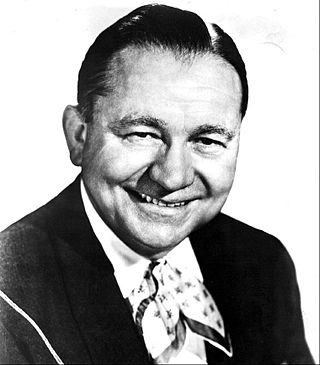
Woodward Maurice "Tex" Ritter was a pioneer of American Country music, a popular singer and actor from the mid-1930s into the 1960s, and the patriarch of the Ritter acting family. He is a member of the Country Music Hall of Fame.

Dorothy Fay was an American actress mainly known for her appearances in Western movies.

"The Wayward Wind" is a country song written by Stanley Lebowsky (music) and Herb Newman (lyrics), and first recorded by American singer Gogi Grant in 1955, and released in 1956. Grant's version reached No. 1 on both the Cash Box charts, where it remained at No. 1 for five weeks, and the Billboard charts, remaining at No. 1 for six weeks, ending Elvis Presley's seven-week run at No. 1 with "Heartbreak Hotel". It remained in the top 10 for fifteen weeks, and was ranked as the No. 5 song for 1956 according to Billboard. It became a Gold record. Members of the Western Writers of America chose the song as one of the Top 100 Western songs of all time.
"Remember the Alamo" is a song written by Texan folk singer and songwriter Jane Bowers. Bowers details the last days of 180 soldiers during the Battle of the Alamo and names several famous figures who fought at the Alamo, including Mexican general Santa Anna and Texans: Jim Bowie, William Barrett Travis and Davy Crockett. It champions the Texans' efforts against Mexico to establish an independent republic.

A singing cowboy was a subtype of the archetypal cowboy hero of early Western films. It references real-world campfire side ballads in the American frontier. The original cowboys sang of life on the trail with all the challenges, hardships, and dangers encountered while pushing cattle for miles up the trails and across the prairies. This continues with modern vaquero traditions and within the genre of Western music, and its related New Mexico, Red Dirt, Tejano, and Texas country music styles. A number of songs have been written and made famous by groups like the Sons of the Pioneers and Riders in the Sky and individual performers such as Marty Robbins, Gene Autry, Roy Rogers, Tex Ritter, Bob Baker and other "singing cowboys". Singing in the wrangler style, these entertainers have served to preserve the cowboy as a unique American hero.
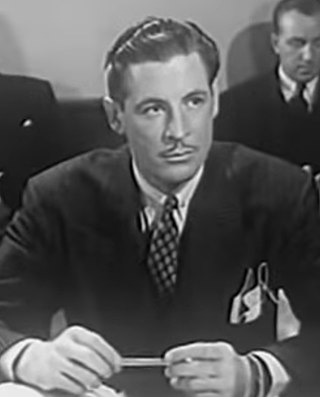
Addison Byron Owen Randall was an American film actor, chiefly in Westerns. He often used a pseudonym for his film work, chiefly Jack Randall, and he played roles as Allen Byron and Byron Vance.

Big Jack is a 1949 American Western film starring Wallace Beery, Richard Conte and Marjorie Main. The movie was directed by Richard Thorpe, and the screenplay was written by Gene Fowler and Otto Eis from the novel by Robert Thoeren. The picture is a comedy-drama, set on the American frontier in the early 1800s, about outlaws who befriend a young doctor in legal trouble for acquiring corpses for anatomical research.

The Smithsonian Collection of Classic Country Music was a multi-volume set of recordings released by the Smithsonian Institution. Released in 1981, the collection contains 143 tracks deemed to be significantly important to the history of country music.
Eleanor Stewart, was an American film actress of the 1930s and 1940s, appearing mostly in Western films.
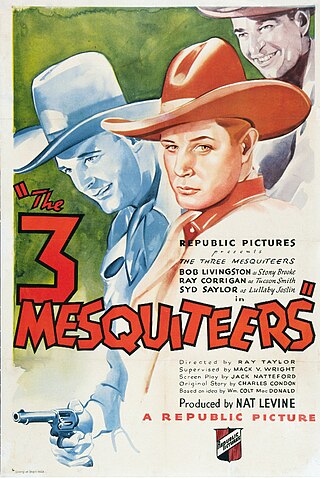
The Three Mesquiteers is a 1936 American Western "Three Mesquiteers" B-movie, starring Bob Livingston, Ray "Crash" Corrigan and Syd Saylor. It is first in a 51-film series of "Three Mesquiteers" films based on characters from the novels written by William Colt MacDonald, eight of which starred John Wayne. The film was directed by Ray Taylor, and produced by Nat Levine and written by Jack Natteford.

Syd Saylor was an American comedic actor and movie cowboy sidekick who appeared in 395 films and television series between 1926 and 1962.

"I'm an Old Cowhand (From the Rio Grande)" is a comic song written by Johnny Mercer for the Paramount Pictures release Rhythm on the Range and sung by its star, Bing Crosby. The Crosby commercial recording was made on July 17, 1936, with Jimmy Dorsey & his Orchestra for Decca Records. It was a huge hit in 1936, reaching the No. 2 spot in the charts of the day, and it greatly furthered Mercer's career. Crosby recorded the song again in 1954 for his album Bing: A Musical Autobiography.
Members of the Western Writers of America chose it as one of the Top 100 Western songs of all time. It has also been covered by numerous jazz musicians, including Sonny Rollins, Monty Alexander, Joshua Redman, and John Scofield.

Hittin' the Trail is a 1937 American Western film directed by Robert N. Bradbury. It stars singing cowboy Tex Ritter and Hank Worden.
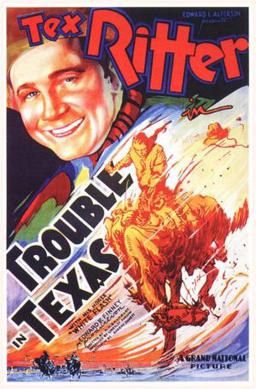
Trouble in Texas is a 1937 American Western film directed by Robert N. Bradbury and starring Tex Ritter, his horse White Flash, Rita Hayworth and Yakima Canutt. The supporting cast features Earl Dwire and Glenn Strange.

The Mystery of the Hooded Horsemen is a 1937 American Western film directed by Ray Taylor. It was singing cowboy Tex Ritter's eighth film for Grand National Pictures. While the film had an original copyright notice, its copyright was not renewed, so it has entered the public domain.

The Utah Trail is a 1938 American Western film directed by Albert Herman. It was Tex Ritter's final film for Grand National Films. Despite the song and title, the film takes place on the Arizona/Mexico border and not Utah. The film is based on a short story that appeared in Ranch Romances magazine.
"The Old Chisholm Trail" is a cowboy song first published in 1910 by John Lomax in his book Cowboy Songs and Other Frontier Ballads.

Where the Buffalo Roam is a 1938 American Western film directed by Albert Herman and starring Tex Ritter.
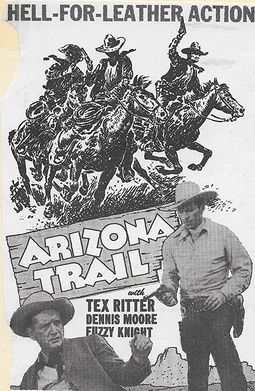
Arizona Trail is a 1943 American Western film directed by Vernon Keays and starring Tex Ritter.

Headin' for the Rio Grande is a 1936 American Western film directed by Robert North Bradbury and written by Robert Emmett Tansey. The film stars Tex Ritter, Eleanor Stewart, Syd Saylor, Warner Richmond, Charles King, Earl Dwire, Forrest Taylor, William Desmond and Snub Pollard. The film was released on December 20, 1936, by Grand National Films Inc.

















